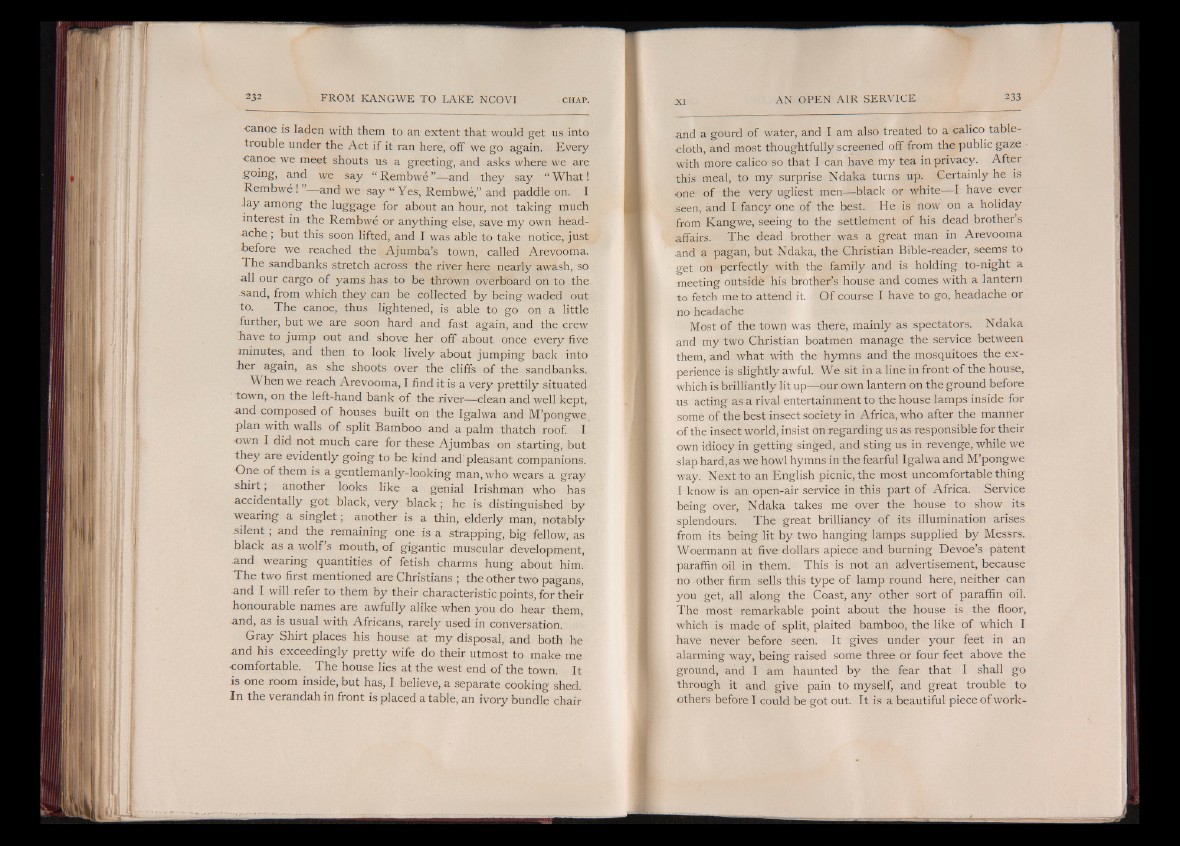
•canoe is laden with them to an extent that would get us into
trouble under the Act if it ran here, off we go again. Every
•canoe we meet shouts us a greeting, and asks where we are
going, and we say “ Rembwe ■**-—and they say “ What!
Rembw6! — and we say “ Yes, Rembwe,” and paddle on. I
Jay among the luggage for about an hour, not taking much
interest in the Rembwe or anything else, save my own headache
; but this soon lifted, and I was able to take notice, just
.before we reached the Ajumba’s town, called Arevooma.
The sandbanks stretch across the river here nearly awash, so
■all our cargo of yams has to be thrown overboard on to the
sand, from which they can be collected by being waded out
to. The canoe, thus lightened, is able to go on a little
further, but we are soon hard and fast again, and the crew
have to jump out and shove her off about once every five
minutes, and then to look lively about jumping back into
her again, as she shoots over the cliffs of the sandbanks.
When we reach Arevooma, I find it is a very prettily situated
town, on the left-hand bank of the river— clean and well kept,
•and composed of houses built on the Igalwa and M’pongwe
plan with walls of split Bamboo and a palm thatch roof. I
•own I did not much care for these Ajumbas on starting, but
they are evidently going to be kind and pleasant companions.
One of them is a gentlemanly-Iooking man, who wears a gray
shirt, another looks like a genial Irishman who has
accidentally got black, very black; he is distinguished by
wearing a singlet; another is a thin, elderly man, notably
silent; and the remaining one is a strapping, big fellow, as
black as a wolf’s mouth, of gigantic muscular development,
and wearing quantities of fetish charms hung about him.
The two first mentioned are Christians ; the other two pagans,
and I will refer to them by their characteristic points, for their
honourable names are awfully alike when you do hear them,
and, as is usual with Africans, rarely used in conversation.
Gray Shirt places his house at my disposal, and both he
and his exceedingly pretty wife do their utmost to make me
•comfortable. The house lies at the west end of the town. It
is one room inside, but has, I believe, a separate cooking shed.
In the verandah in front is placed a table, an ivory bundle chair
and a gourd of water, and I am also treated to a calico tablecloth,
and most thoughtfully screened off from the public gaze ■
with more calico so that I can have my tea in privacy. After
this meal, to my surprise Ndaka turns up. Certainly he is
one of the very ugliest men— black or white— I have ever
seen, and I fancy one of the best. He is now on a holiday
from Kangwe, seeing to the settleinent of his dead brother s
affairs. The dead brother was a great man in Arevooma
and a pagan, but Ndaka, the Christian Bible-reader, seems to
get on perfectly with the family and is holding to-night a
meeting outside his brother’s house and comes with a lantern
to fetch me to attend it. O f course I have to go, headache or
no headache
Most of the town was there, mainly as spectators. Ndaka
and my two Christian boatmen manage the service between
them, and what with the hymns and the mosquitoes the e x perience
is slightly awful. We sit in a line in front of the house,
which is brilliantly lit up— our own lantern on the ground before
us acting as a rival entertainment to the house lamps inside for
some of the best insect society in Africa, who after the manner
o f the insect world, insist on regarding us as responsible for their
own idiocy in getting singed, and sting us in revenge, while we
slap hard, as we howl hymns in the fearful Igalwa and M’pongwe
way. Next to an English picnic, the most uncomfortable thing
I know is an open-air service in this part of Africa. Service
being over, Ndaka takes me over the house to show its
splendours. The great brilliancy of its illumination arises
from its being lit by two hanging lamps supplied by Messrs.
Woermann at five dollars apiece and burning Devoe’s patent
paraffin oil in them. This is not an advertisement, because
no other firm sells this type of lamp round here, neither can
you get, all along the Coast, any other sort of paraffin oil.
The most remarkable point about the house is the floor,
which is made of split, plaited bamboo, the like of which I
have never before seen. It gives under your feet in an
■alarming way, being raised some three or four feet above the
ground, and I am haunted by the fear that I shall go
through it and give pain to myself, and great trouble to
others before I could be got out. It is a beautiful piece of work